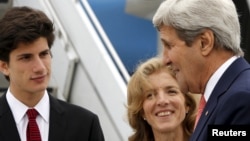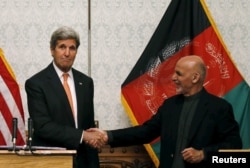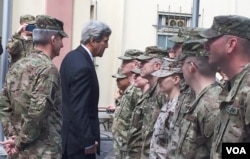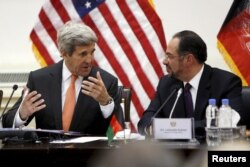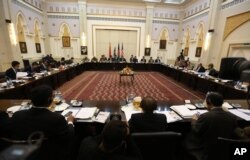Global security threats are among the focal points for U.S. Secretary of State John Kerry and other Group of Seven (G-7) foreign ministers who have launched a two-day meeting in Hiroshima, Japan.
Kerry arrived in Hiroshima Sunday following a visit to Afghanistan. He is the first U.S. secretary of state to visit Hiroshima, which was devastated by a U.S. atomic bomb near the end of World War II.
In an interview with a Hiroshima newspaper (Chugoku Shimbun), Kerry said most global threats to international peace require collective action.
“Gatherings, such as this one are important opportunities to help us address urgent international political and security concerns and to speak with one, clear voice on concrete actions needed,” said Kerry.
The Group of Seven industrialized countries also includes Britain, Canada, France, Germany, Italy and Japan. Some of the European members are grappling with security challenges in the aftermath of recent terrorist attacks in Brussels and Paris.
In addition to terrorism, the group is expected to discuss maritime security in the South China Sea and the refugee crisis affecting Europe and the Middle East.
On the sidelines of talks, Kerry and other foreign ministers will visit Peace Memorial Park, a World War II memorial.
The U.S. dropped an atomic bomb on Hiroshima, which led to the end of the war. The bombing resulted in the deaths of about 140,000 people. Three days later, the U.S. dropped a second bomb on the port city of Nagasaki, killing about 70,000 people.
Kerry’s intention for visiting the memorial is to “recognize the huge loss of life” that occurred during the war, said State Department spokesman Mark Toner.
“It is also an acknowledgement that since the end of World War II that the United States and Japan have become the closest of friends and strong allies,” he added.
The park has become a symbol of nuclear disarmament.
“Being in this city, it will help us carry out a message of peace and disarmament in the world, said Italian Foreign Minister Paolo Gentiloni.
Kerry’s visit to the country is also designed to clear the way for President Barack Obama’s May visit to Japan to attend the G-7 leaders summit.
Kerry traveled to Hiroshima from Kabul, where he discussed issues including regional security and the status of efforts to hold peace talks with the Taliban. Kerry met with President Ashraf Ghani and Chief Executive Abdullah Abdullah.
At a joint news conference in Kabul, Kerry and Ghani discussed a wide range of issues, looking ahead to a NATO summit in Warsaw in July that will review the status of Afghan security forces, and also a conference on development aid to be held later this year in Brussels.
U.S. officials say several rounds of explosions erupted nearly 200 meters from the U.S. embassy in Kabul shortly after Kerry departed. There were no injuries and no immediate indication that Kerry was a target.
More troop cuts
President Obama has said he plans to reduce the number of U.S. troops in Afghanistan from 9,800 to 5,500 by next year, but other recent reports predict that goal will be delayed. Kerry said Obama will rely on input from American military commanders in Afghanistan before making a final determination about troop cuts.
Bilateral commission talks
Earlier Saturday, Kerry and Afghan Foreign Minister Salahuddin Rabbani presided at a meeting of the commission the two countries established to help Afghanistan's postwar development into "a strong, stable, democratic and self-reliant state."
Rabbani said the Kabul government is making every effort to advance peace and reconciliation, but that can happen only if the Taliban comes back to the negotiating table.
"We believe the international community can help encourage key actors in the region to have the Taliban group engage in direct talks with the Afghan government," the foreign minister said.
Peace talks
The Quadrilateral Coordination Group — the United States, Afghanistan, Pakistan and China — has been trying to get peace talks moving, but Taliban representatives refused to take any part in the most recent effort, shortly before it was to begin last month.
A lengthy and wide-ranging statement by the U.S.-Afghanistan Bilateral Commission stressed the two countries' "respect for human rights, the rules of law and democratic values." They pledged continuing cooperation and said three working groups would continue to meet on defense and security; democracy and governance; and economic and social development.
Kerry highlighted Afghanistan's need for peace and security.
"When lasting and historic change is the goal, there are no opportunities to relax," the top U.S. diplomat said. "When you have terrorists who are attempting to stop that work, stand in the way of that work, limit its success or even turn the clock backwards, obviously there is no time to relax."
Support for unity government
Another goal for Kerry's visit was to show continued U.S. support for Afghanistan's national unity government.
Kerry helped broker the deal that produced the power-sharing arrangement between Ghani and Abdullah, who is Afghanistan's "chief executive," with powers equal to that of the president. The unity agreement emerged after bitter disputes over results of the 2014 presidential election, which Abdullah asserted he would have won but for electoral fraud.
The president/chief executive arrangement will continue, Kerry said, adding: “There is no end to this agreement at the end of two years, or six months from now. This is an agreement for a unity government, the duration of which is five years.”
True national unity has been an elusive goal, however, and Afghanistan's people appear to be deeply dissatisfied with their government.
Kerry is on a week-long tour of the Middle East and Asia that also included stops in Bahrain and Iraq. After Japan, he will attend a trade event in California before returning to Washington.




